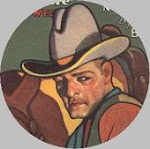“Traitor of the Natchez Trace” by Ryerson Johnson (10-Story Western, issue unknown, 1943; reprinted in The Best Western Stories of Ryerson Johnson [Thorndike, Maine: GK Hall & Co., 1990] edited by Bill Pronzini and Martin H. Greenberg).
Once upon a time I was surprised to learn that Kenneth Robeson, the author of Doc Savage and the Avenger, did not truly exist. Instead, Lester Dent was the scripter of all those Doc Savage novels, and Paul Ernst was the Avenger’s author.
Then I was surprised again, later, to learn that Lester Dent wasn’t alone in writing Doc’s adventures; Ryerson Johnson was one of the ghost writers for the series. Still later I was less surprised and more interested to learn that Johnson wrote extensively outside the hero-pulp field, primarily in the arena of north-westerns. As I’ve read more of these latter tales in the past few years, I’ve come to prefer these stories to Johnson’s Doc Savage work.
“Traitor of the Natchez Trace” is actually not a north-western. Instead, it’s a frontier story -- not a western, really, because it’s set along the Natchez Trace (thus the title) when the Mississippi River was consider The West. I enjoy tales like this, which take place outside the typical western formula and include a bit of history or cultural information as additional narrative color to create a stronger verisimilitude. A lot of stories by Les Savage, Jr., are similar in this regard -- tales about some aspect of western history that hasn’t become cliché because of overexposure in stories or movies.
In this story, Johnson relies on a variation of the theme “The Mail Must Go Through.” The Natchez Trace is full of rascals, rogues, and outlaws who rob and murder those traveling along the trail. Many are farmers and such who travel down the river on flatboats to New Orleans with goods to sell; when they return north over land, the robbers take the currency they’ve earned by selling their wares. The two outlaws who feature in Johnson’s story, Big Yellen and Little Yellen, seem based (at least in part) on two actual robber-murderers (who would have been classified serial killers today), the Harpe Brothers -- Big Harpe and Little Harpe -- who operated in Tennessee and Kentucky in the late 1790s.
The hero of the story is a mail carrier who travels the Trace both directions. He has an uneasy truce with the outlaws along the trail because he fills them in on the news from the towns he visits. They let him travel unmolested because he doesn’t turn them in, but he does not help them either -- he won’t tell them when he knows of moneyed travelers on the Trace. This truce exists so the mail can go through. Yet the mail carrier is held in suspicion by both the lawful and the unlawful.
One day the Yellens have had enough. Stopped and searched by Little Yellen, the disgruntled mail carrier continues on his way North, only to meet a man hiding from the outlaws and who tells the carrier he has a bag of money he earned down south. He begs the mail carrier for help getting safely past the outlaws with his money so he and his neighbors can save their homesteads from foreclosure. Against his better judgment, the mail carrier agrees to help, primarily because he’s fed up with the outlaws and the legal authorities’ lack of gumption in taming the Trace.
Complications ensue when Little Yellen unexpectedly shows up again and is shot and killed. The mail carrier and the farmer must figure out how to face Big Yellen, whom they know awaits farther along the trail.
Johnson builds a nice tale in describing their solution, laying out the history and setting for the narrative, and resolving the conundrums the mail carrier encounters. He throws in some history, some interesting characters, and tells his story in a lively way. As with other Johnson stories that were published in genre-specific pulp magazines, “Traitor of the Natchez Trace” would have fit just fine on the pages of that king of pulps, Adventure Magazine. It has the ring of authenticity that was so important to the editors of that publication and that pleases the discerning western reader.
I've added a category page to The Spur & Lock Spinner Rack for some of Johnson's stories.
The murderous Harpe brothers, on whom Johnson based his Natchez Trace bad guys, are the subjects of many books and Internet pages. In some cases legend is difficult to unravel from fact. Click here for info from the Illinois History site, "Frontier serial killers: The Harpes."
Click here for The Tennessee Encyclopedia of History and Culture, "MICAJAH 'BIG"'(ca. 1768-1799) AND WILEY 'LITTLE' HARPE (ca. 1770-1804)."
The Court TV Crime Library has a chapter on the Harpes: "These killing cousins raped, thieved and [word missing] their way around frontier-era Tennessee and Kentucky with astonishing cruelty, cutting the throats of babies, bashing in the heads of children, killing more for pleasure than plunder." Click here to learn more.
Tuesday, December 30, 2008
“Traitor of the Natchez Trace” by Ryerson Johnson
Subscribe to:
Post Comments (Atom)






2 comments:
These old pulps are great - The stories are so well paced to grab attention. I'm going to catch up on a lot more pulp classics in 2009
Storytelling and entertainment -- that was the focus of the fictioneers who filled the pulp paper pages of all those fiction magazines. Pacing was very important (just like in telling a joke), and the development of the popular fiction style of writing -- influenced mightily by the BLACK MASK school of writers -- that so marked 20th Century genre fiction, really had its foundation in the pulp magazines. You can find a lot of public domain pulp magazine short stories online at the PulpGen site, including some Ryerson Johnson stories:
http://pulpgen.com/pulp/downloads/
Post a Comment